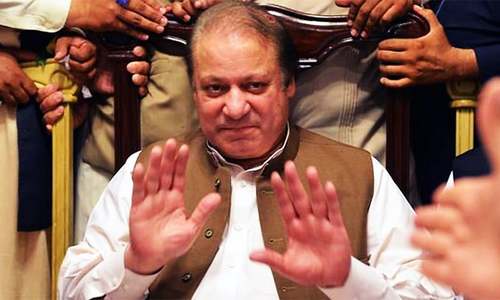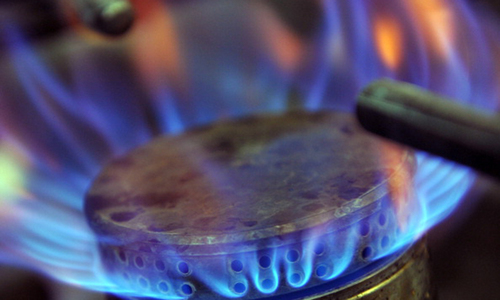ISLAMABAD: The government has approved 97 natural gas expansion schemes worth more than Rs37 billion on the recommendations of members of parliament, most of whom belong to the ruling party’s political base — Punjab.
The 97 schemes were all approved after the prime minister recently relaxed a moratorium on the expansion of gas supply schemes in Punjab. Twenty schemes were either meant for Khyber Pakhtunkhwa, Balochistan and Sindh — where expansion schemes can be undertaken due to their higher shares in gas production — or were announced directly by the prime minister during his public meetings in certain constituencies.
According to Article 158 of the Constitution, titled ‘Priority of requirements of natural gas’: “The province in which a well-head of natural gas is situated shall have precedence over other parts of Pakistan in meeting the requirements from the well-head.”
But the remaining 77 schemes — recommended by MNAs of the PML-N — were all meant for Punjab. Of the total amount, schemes worth Rs27.23bn would be implemented through indirect funding, while those worth Rs7.6bn would be financed by direct funding through block allocations and the Public Sector Development Programme (PSDP), which will be spent by Sui Northern Gas Pipelines Limited (SNGPL).
More gas connections worth Rs2.3bn are also being implemented under the Sustainable Development Goals (SDGs), which includes Rs315 million to be spent by Sui Southern Gas Company Limited (SSGCL) and Rs2.01bn by SNGPL.
A government official said a summary for ex-post facto approval of these schemes was included in the agenda of the federal cabinet meeting scheduled for March 24, which was later postponed. But the government had already started releasing funds for the gas expansion schemes, he said. For example, Rs2.225bn under the SDG head had already been transferred to the executing agencies — SNGPL and SSGCL — while schemes worth Rs200m are still under process.
Interestingly, it is the Lahore-based SNGPL and Punjab in particular that is facing an acute gas shortage, particularly in winter months. This is evident from the fact that Punjab produces only three per cent, 121 million cubic feet per day (MMcfd) of the country’s total natural gas and consumes about 42pc, 1,154MMcfd to be precise.
Compared to this, Sindh produces 2,511MMcfd, about 64pc of all domestically-produced gas, and consumes around 1,256MMcfd, or 46pc. Likewise, Balochistan has 17pc (680MMcfd) in gas production against its 2pc (51MMcfd) consumption. KP on the other hand has a fairly equitable share both in gas production and consumption of 10pc and 9pc, respectively.
A report on the 97 schemes approved by the prime minister showed that the largest allocation of Rs3.2bn had been set aside for NA-18, the constituency of Deputy Speaker Murtaza Javed Abbasi.
This is followed by Rs2.4bn for NA-21 where retired Capt Mohammad Safdar — the prime minister’s son-in-law — is the local MNA. The third largest allocation is for NA-19, the constituency of Babar Nawaz Khan. All three constituencies are located in the Hazara division of KP. The largest allocation in Punjab of Rs1.73bn was for schemes in Sheikhupura’s NA-136, where Chaudhry Bilal Virk was elected.
Seven schemes of various sizes were announced by the prime minister himself or were approved directly by his office.
Prominent non-PML-N beneficiaries of gas schemes include Maulana Fazlur Rehman, federal Minister Akram Khan Durrani, Zaffar Durrani, former prime minister Zafarullah Jamali, Awami National Party Senator Zahid Khan, KP Chief Minister Pervez Khattak and Aftab Sherpao.
The prime minister also approved the recommendations of Petroleum Minister Shahid Khaqan Abbasi, Water and Power Minister Khwaja Asif, Minister of State for Education Baleeghur Rehman, Health Minister Saira Afzal Tarar, Defence Production Minister Rana Tanveer, Punjab’s Population Minister Begum Zakia Shahnawaz, Parliamentary Affairs Minister Sheikh Aftab Ahmed, parliamentary secretary Syed Saqlain Shah, Human Rights Minister Kamran Michael, Kashmir Affairs Minister Birjees Tahir, Law Minister Zahid Hamid and Minister of State for Power Abid Sher Ali.
Others include Waseem Ahmad Sheikh, Mohammad Amjad Faooq Khosa, M. Arshad Khan Laghari, Waheed Alam Khan, Rana Mohammad Hayat Khan, Rana Mohammad Ishaq Khan, Sardar Mohammad Irfan Dogar, Afzal Khokhar, Ghulam Rasul Sahi, Mian Shahid Khan Bhatti, Rao Mohammad Ajmal Khan, Mumtaz Tarar, Mian Mohammad Farooq, MPA Rana Mahmoodul Hasan MPA, Mohsin Ranjha, Talal Chaudhry, Senator Baz M. Khan, Dr Imran Khattak, Bashir Virk, Mian Javed Latif, Rana Zahid Husain Khan, Mehdi Bhatti, Khalid Javed Warraich, Ammar Chaudhry, Azhar Qayyum Nahra, Moeen Wattoo, Raja Javed Ikhlas, Gohram and Chaudhry Nazeer.
Published in Dawn, March 27th, 2017














































